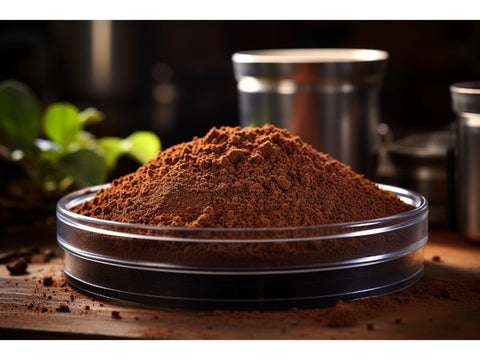Are you a coffee lover looking to make healthier choices?
We explore the world of whole bean coffee and its potential health benefits. From being rich in antioxidants to boosting brain function and reducing the risk of chronic diseases, whole bean coffee offers a myriad of advantages.
We also delve into the differences between whole bean and ground coffee, discussing processing methods, taste, and aroma.
Curious about whether whole bean coffee is a healthier option? Stay tuned as we uncover the potential health risks and how to choose the best whole bean coffee for your daily brew.
What Is Whole Bean Coffee?
Whole bean coffee refers to coffee that is sold in its whole, unground form, consisting of intact coffee beans that preserve the coffee's freshness and aroma. These beans are the raw form of coffee before they are ground for brewing.
Once the coffee cherries are harvested, they are carefully processed to extract the beans, which are then dried and stored until they are ready for roasting. Keeping the beans whole until just before brewing helps to retain their inherent flavors and oils that contribute to a rich and complex taste profile. The intact beans also safeguard the coffee's delicate compounds from exposure to oxygen and moisture, ensuring a more intense and enjoyable sensory experience for coffee enthusiasts.
Roasting whole beans just before use allows for the aroma to fully flourish, resulting in a superior cup of coffee with unmatched freshness and quality.
What Are The Health Benefits Of Whole Bean Coffee?

Whole bean coffee offers a range of health benefits, making it a popular choice among health-conscious consumers. From antioxidants to potential disease prevention, the consumption of whole bean coffee has been linked to various positive health outcomes.
One key factor contributing to the health benefits of whole bean coffee is its high antioxidant content. Antioxidants play an essential role in protecting the body against damage caused by free radicals, which can contribute to aging and various diseases. Research has shown that the antioxidants found in whole bean coffee have the potential to reduce inflammation, improve heart health, and even lower the risk of certain types of cancer. These findings highlight the significant impact that incorporating whole bean coffee into your daily routine can have on your overall well-being.
Rich In Antioxidants
Whole bean coffee is rich in antioxidants, such as chlorogenic acid and polyphenols, which have been shown to help reduce inflammation and protect cells from damage.These antioxidants play a crucial role in maintaining overall health and well-being. Chlorogenic acid, in particular, has been linked to lowering blood pressure and improving heart health. Polyphenols, on the other hand, are known for their anti-aging properties and ability to boost the immune system. By combating free radicals in the body, these antioxidants contribute to reducing the risk of chronic diseases like heart disease, diabetes, and certain types of cancer.
Incorporating whole bean coffee into your daily routine can provide a natural and effective way to reap these health benefits.
Boosts Brain Function
Consuming whole bean coffee can boost brain function due to its caffeine content, which acts as a stimulant that enhances cognitive performance, focus, and alertness.
Studies have shown that the caffeine in coffee can improve memory recall and reaction time, making it a popular choice for students, professionals, and anyone seeking a mental boost. Caffeine works by blocking adenosine, a neurotransmitter that promotes sleep, thus promoting increased neural firing in the brain. This heightened brain activity leads to improved mood and increased mental acuity, allowing individuals to stay more attentive and productive throughout the day.
Reduces Risk Of Chronic Diseases
Regular consumption of whole bean coffee has been associated with a reduced risk of chronic diseases, including type 2 diabetes, heart disease, and certain cancers, due to its bioactive compounds and antioxidants.
These bioactive compounds found in whole bean coffee, such as chlorogenic acid and caffeine, play a crucial role in reducing inflammation and improving insulin sensitivity, which are key factors in the development of chronic diseases. Antioxidants, such as polyphenols, protect cells from damage caused by harmful free radicals, further contributing to the preventative effects of whole bean coffee.
Health studies have shown that individuals who regularly consume whole bean coffee have a lower risk of developing these chronic conditions compared to non-coffee drinkers.
How Is Whole Bean Coffee Different From Ground Coffee

Whole bean coffee differs from ground coffee primarily in its form and processing method. While whole bean coffee retains more of its original flavor profile and aroma, ground coffee undergoes grinding which accelerates oxidation and flavor loss.
When coffee beans are whole, they have a longer shelf life as the protective outer layers shield them from the effects of oxidation. This means that the flavors and aromas are preserved until the beans are ground for brewing.
In contrast, once coffee beans are ground, their increased surface area allows for quicker contact with air, leading to faster oxidation. This rapid oxidation process can result in a loss of freshness and the degradation of subtle flavor notes, affecting the overall quality of the brewed coffee.
Read: Whole Bean vs Ground Coffee: 3 Reasons You Should Be Buying Whole Bean
Processing Method
The main difference between whole bean coffee and ground coffee lies in the processing method. Whole bean coffee retains its original form, whereas ground coffee undergoes grinding, which exposes the coffee to increased surface area and oxidation.
Grinding plays a crucial role in coffee production as it influences the flavor profile and aroma. When coffee beans are ground, they release oils and compounds that contribute to the overall taste experience. The grind size also affects the brewing process; finer grinds are suitable for espresso, while coarser grinds work well in French press brewing.
Maintaining freshness is key to preserving these flavors. Once coffee is ground, it begins to lose its freshness faster due to increased surface area exposed to air. Storing ground coffee in airtight containers and grinding beans just before brewing are essential practices to ensure a flavorful cup.
Taste and Aroma
The taste and aroma of whole bean coffee are often superior to those of ground coffee, as the intact beans preserve essential oils and volatile compounds that contribute to a richer flavor profile and aromatic experience.
When coffee beans are ground, they lose some of their essential oils and aromatic compounds due to exposure to air and light, leading to a quicker deterioration of flavors. With whole bean coffee, however, these compounds remain intact until the beans are ready to be brewed, resulting in a fresher and more vibrant taste. The sensory experience of whole bean coffee often includes a more pronounced acidity, nuanced sweetness, and a fuller body compared to ground coffee, making it a favorite among coffee enthusiasts who appreciate the complexity of flavors in each cup.
Is Whole Bean Coffee Healthier Than Ground Coffee?

The debate on whether whole bean coffee is healthier than ground coffee often centers around the retention of health benefits, freshness, and aroma. Whole bean coffee enthusiasts argue that the intact beans preserve essential nutrients and flavors better than ground coffee.
Proponents of whole bean coffee highlight that the grinding process for ground coffee can lead to a faster loss of volatile compounds and antioxidants, which are crucial for reaping the full health benefits of the beverage. The surface area exposure that occurs during grinding can result in quicker oxidation, potentially diminishing the freshness and potency of the coffee. Therefore, the way in which coffee is processed plays a vital role in determining its overall nutritional value.
Retains More Nutrients
Whole bean coffee is often considered healthier than ground coffee as it retains more nutrients, such as antioxidants and essential oils, due to the intact nature of the beans that are preserved until the brewing process.
When coffee beans are ground, they have a larger surface area exposed to air, leading to quicker oxidation and degradation of nutrients. On the other hand, whole bean coffee protects these essential components, ensuring a higher concentration of health-boasting compounds in each cup. By maintaining the integrity of the beans during storage and grinding right before brewing, you can savor the full spectrum of flavors and health benefits that whole bean coffee has to offer.
Less Exposure To Contaminants
Whole bean coffee is less exposed to contaminants compared to ground coffee, as the intact beans are shielded from external factors that may introduce impurities during the grinding process.
When coffee beans are ground, they are more susceptible to coming into contact with various contaminants, such as mold, dust, and even insect residues. The grinding process itself generates heat, which can potentially degrade the quality of the coffee and introduce further impurities. On the other hand, intact coffee beans remain relatively untouched until the brewing process begins, offering a cleaner and more pure coffee experience. By choosing whole bean coffee and grinding it just before preparation, coffee enthusiasts can minimize their exposure to potential health risks associated with contaminants.
Fresher Taste
Whole bean coffee often delivers a fresher taste compared to ground coffee, as the intact beans preserve the volatile compounds responsible for flavor and aroma until the beans are ground just before brewing.This freshness factor plays a crucial role in enhancing the overall sensory experience of coffee. When coffee beans are ground right before brewing, they release a burst of flavors and aromas that may be lost in pre-ground coffee. The aroma of freshly ground coffee is particularly captivating, as it fills the room with enticing scents that prepare the drinker for a delightful coffee experience. The act of grinding the beans also adds an element of ritual and anticipation to the coffee-making process, heightening the enjoyment of the final cup.
More Control Over Grind Size
Using whole bean coffee allows for more control over grind size, enabling coffee enthusiasts to adjust the coarseness or fineness of the coffee grounds based on their preferred brewing method, thereby influencing the flavor profile of the final brew.
By selecting the appropriate grind size, individuals can fine-tune the extraction process. For instance, a coarser grind is ideal for methods like French press, while a finer grind works well for espresso machines. The surface area of the coffee grounds directly affects the rate of extraction during brewing, impacting the strength and nuances of the resulting beverage.
Understanding the correlation between grind size and brewing techniques is key to mastering the art of coffee preparation and achieving a customized and delightful coffee experience.
What Are The Possible Health Risks Of Whole Bean Coffee?

While whole bean coffee offers numerous health benefits, there are potential health risks associated with its consumption, such as caffeine sensitivity, acid reflux, increased cholesterol levels, and the potential exposure to mycotoxins.
Consuming whole bean coffee, with its rich antioxidant content, is believed to reduce the risk of certain diseases like type 2 diabetes and Parkinson's.
Excessive caffeine intake can lead to jitteriness, insomnia, and even heart palpitations. Mycotoxins, produced by molds that may contaminate coffee beans, have been linked to adverse health effects, including liver damage and immune system suppression.
It is essential to balance the positives of coffee consumption with an awareness of these potential risks.
Caffeine Sensitivity
Individuals with caffeine sensitivity may experience adverse effects from consuming whole bean coffee, such as jitteriness, restlessness, and increased heart rate, due to the stimulant properties of caffeine found in coffee beans.
This sensitivity to caffeine can vary greatly among individuals, with some people experiencing pronounced symptoms even after consuming small amounts of coffee or other caffeinated beverages. Common signs of caffeine intolerance include headaches, digestive issues, and difficulty sleeping.
It's important for those who are sensitive to caffeine to be mindful of their intake, opting for decaffeinated versions or other non-caffeinated options to avoid triggering negative reactions in their bodies. By being aware of their own caffeine sensitivity and making informed choices, individuals can manage their consumption effectively and enjoy their favorite beverages without undesirable side effects.
Acid Reflux
For individuals prone to acid reflux, consuming whole bean coffee may exacerbate symptoms due to its acidity levels, which can irritate the digestive tract and lead to discomfort or heartburn.
It is essential for those with sensitive stomachs to be mindful of the acidity of their coffee choices, as high acidity levels can trigger acid reflux. There are ways to enjoy coffee without experiencing these issues. Opting for a darker roast or using brewing methods such as cold brew or French press can help reduce the overall acidity in your cup. Choosing coffees with lower acidity profiles, such as Sumatran or Brazilian beans, can also be beneficial for individuals looking to enjoy their favorite drink without the unwanted side effects.
Increased Cholesterol Levels
Excessive consumption of unfiltered coffee, such as whole bean coffee, has been linked to increased cholesterol levels in some individuals, as compounds present in coffee beans can impact cholesterol metabolism.
These compounds include cafestol and kahweol, which are diterpenes known to raise LDL cholesterol levels. The relationship between coffee consumption and cholesterol levels is complex, as studies have also suggested that certain compounds in coffee, such as chlorogenic acids, may have beneficial effects on cholesterol metabolism.
Moderation is key when it comes to balancing the potential risks and benefits of coffee consumption for heart health. Understanding one's own cholesterol levels and consulting with a healthcare provider can help in determining the appropriate amount of coffee to include in a heart-healthy diet.
Potential Exposure To Mycotoxins
Mycotoxins, harmful substances produced by molds, can contaminate coffee beans and pose health risks to individuals consuming whole bean coffee, highlighting the importance of proper storage and quality control measures in coffee production.
Exposure to mycotoxins in coffee beans can lead to various health hazards, including potential toxicity and adverse effects on the nervous and immune systems. Studies suggest that mycotoxins may also have carcinogenic properties, raising concerns about long-term health implications.
To minimize mycotoxin contamination, coffee producers must adhere to strict quality control practices, such as ensuring proper drying, storage, and processing techniques. Consumers can reduce their risk by purchasing coffee from reputable sources that prioritize quality and safety standards.
How To Choose The Best Whole Bean Coffee?

Selecting the best whole bean coffee involves considering factors such as choosing organic and fair trade certified beans, examining the roast date and origin details, and experimenting with various roasts and blends to find the perfect coffee match.
When opting for organic and fair trade certified coffee beans, consumers are not only supporting sustainable farming practices but also ensuring that the beans were produced without harmful pesticides and under fair labor conditions.
Roast profiles play a crucial role in determining the flavor and aroma of the brewed coffee, with light roasts offering floral and fruity notes, medium roasts providing a balanced flavor, and dark roasts showcasing a bold and smoky taste.
Read: Understanding the difference between different roasts
By paying attention to sourcing information, customers can trace the journey of their coffee beans, appreciating the diversity of flavors and nuances influenced by the region of cultivation.
Look For Organic and Fair Trade Certified Beans
When choosing whole bean coffee, prioritize organic and fair trade certified beans to support sustainable practices, ensure high-quality standards, and promote ethical sourcing within the coffee industry.
Opting for organic and fair trade certified whole bean coffee not only benefits the environment but also guarantees that the beans are produced without harmful pesticides or chemicals. These certifications ensure that farmers receive fair wages and are provided with safe working conditions. By supporting sustainable and ethical coffee practices, consumers contribute to the preservation of biodiversity and the protection of natural resources. Fair trade practices promote social responsibility and community development in coffee-growing regions, fostering a more equitable and just global marketplace.
Read: Coffee Certifications 101: Organic, Bird Friendly, Fair Trade, And Beyond
Consider Roast Date and Origin
Checking the roast date and origin information of whole bean coffee is crucial for assessing freshness, quality, and flavor profiles, as these details offer insights into the beans' journey from cultivation to roasting.
The roast date indicates how recently the beans were roasted, crucial because coffee starts to lose its flavor and aroma shortly after roasting. Knowing the origin of the beans provides context for their flavor and characteristics, as different regions around the world produce distinct coffee profiles.
Understanding roast profiles, whether light, medium, or dark, helps in choosing the right coffee based on personal preferences, with lighter roasts often highlighting the bean's unique flavors and darker roasts offering a richer, more robust taste.
Experiment With Different Roasts and Blends
Exploring a variety of roasts and blends when choosing whole bean coffee allows coffee enthusiasts to discover their preferred flavor profiles, acidity levels, and aroma notes, leading to a more personalized and enjoyable coffee experience.
By delving into the world of varying roast levels – from light to dark – and experimenting with different blend combinations, coffee lovers can unlock a treasure trove of sensory delight. Roasting techniques play a pivotal role in crafting the nuanced flavors in coffee, with light roasts accentuating bright fruity notes, medium roasts presenting a balanced flavor profile, and dark roasts offering robust intensity.
Developing a set of criteria for selecting the ideal whole bean coffee involves considering factors such as body, acidity, sweetness, and bitterness, aligning with individual taste preferences and brewing methods.

